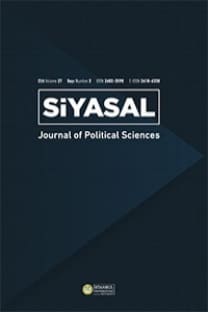Göçün Güvenlikleştirilmesine Yeni Bir Bakış: Türkiye’de Yaşayan Suriyeli Mültecilerin Gözünden Avrupa Birliği Politikaları
Bu çalışmanın temel amacı Soğuk Savaş sonrasında önem kazanan ve 2015 yılında en yüksek noktasına varmadan önce gündeme gelen göç konusunu “inşa edilmiş” sosyal güvensizlik tehdidi olarak sunmaktır. Çalışma devam etmekte olan mülteci krizinden hareketle, güvenlikleştirme teorisini Türkiye’de yaşamakta olan Suriyeli yerleşimci bir örneklem grup ile derinlemesine mülakatlar yoluyla araştırmış ve bu grubun Türkiye’yi seçme nedenlerinin Avrupa’ya ilişkin kültürel güvensizlik algılarıyla ilgili olup olmadığını tespit etmeye çalışmıştır. Çalışma kapsamında geliştirilen mülakatlar Kasım ve Aralık 2019 tarihlerinde yürütülmüş ve Suriyeli mülteci nüfusunun en yoğun olduğu Gaziantep, Antakya ve İstanbul illerinde gerçekleştirilmiştir. Bu bağlamda güvenlikleştirme teorisi ve Türkiye’de gerçekleştirilen mülakatlar arasındaki bağın, Avrupa Birliği’nin (AB) kültürel manada homojen bir toplum yaratma çabası ve bu homojenliğe müdahale eden her türlü farklılığın bir tehdit olarak görülebilmesi durumunu akılda tutarak, Suriyeli mültecilerdeki bilincin açığa çıkması için bir ışık tutmasına çalışılmıştır.
Anahtar Kelimeler:
Avrupa Birliği, göçün güvenlikleştirilmesi, Suriyeli mülteciler, konuşma analizi, popülist partiler
Securitisation of Migration Revisited: European Union Policies Through the Lens of Syrian Refugees Living in Turkey
The main aim of this study is to present migration as a ‘constructed’ societal insecurity threat that became substantial after the Cold War before peaking in 2015. This study applies securitization theory to the ongoing refugee crisis through in-depth interviews with a sample of Syrian settlers in Turkey to determine whether their reasons for choosing to stay in Turkey are linked to their perceptions of cultural insecurity in Europe. The interviews were made in November and December 2019 in Gaziantep, Antakya and İstanbul where most of the Syrian refugees are located. In that sense, the link between the securitisation theory and the interviews made in Turkey attempts to shed light on the awareness of Syrian refugees regarding the fact that the European Union (EU) has tried to create a culturally homogenous society and any kind of difference interfering in this homogeneity can be seen as a threat.
Keywords:
European Union, securitisation of migration, Syrian refugees, speech analysis, populist parties,
___
- Adler E and Barnett M(1998) Security Communities. Cambridge: Cambridge University Press.
- Balzacq T (2008)The Policy tools of securitization: information exchange, EU foreign and interior policies. Journal of Common Market Studies46 (1): 75–100.
- Carrera S and Guild E (2010) Joint operation RABIT 2010 FRONTEX assistance to Greece’s border with Turkey: revealing the deficiencies of Europe’s Dublin Asylum System. CEPS Paper in Liberty and Security in Europe.
- Dennison S. and Pardijs D (2016) The world according to Europe’s insurgent parties: Putin, migration and people power. European Council on Foreign Relations.
- European Commission (2015) A European Agenda on Migration. Communication from The Commission of the European Parliament, The European Council and The Council, The European Economic and Social Committee and The Committee of The Regions, 240 Final, 13 May. Brussels.
- European Commission (2016) Proposal for a Regulation of the European Parliament and of the Council, 272 Final, 4 May. Brussels.
- European Commission (2018) Progress Report on The Implementation of The European Agenda on Migration. Communication from The Commission to The European Parliament, The European Council and The Council, 250 Final, 14 March. Brussels.
- European Commission (2019) Progress Report on The Implementation of The European Agenda on Migration. Communication from The Commission to The European Parliament, The European Council and The Council, 126 Final, 6 March. Brussels.
- Derrida J (1992) The Other Heading: Reflections on Today’s Europe, Translated by Pascale Anne Brault and Michael B. Naas. Bloomington: Indiana University Press.
- Deutsch K (1957) Political Community and the North Atlantic Area: International Organization in the Light of Historical Experience. Princeton University Press.
- Deutsche Welle (2019) Germany needs immigrants to stay competitive: economist. Available at: www.dw.com/en/germany-needs-immigrants-to-stay-competitive-economist/a-51158216 (accessed 1 December 2020).
- Howell A and Richter-Montpetit M (2020) Is securitization theory racist? Civilizationism, methodological whiteness, and anti-black thought in the Copenhagen School, Security Dialogue 51(1): 3-22.
- Huysmans J (1995) migrants as a security problem: dangers of “securitizing” societal issues. In Migration and European Integration: The Dynamics of Inclusion and Exclusion, edited by Robert Miles and Dietrich Thraenhart, 53–72. London: Pinter.
- Huysmans J (2000) The European Union and the securitization of migration. Journal of Common, Market Studies 38(5): 751–77.
- Ibryamova N (2002) Migration from Central and Eastern Europe and societal security in the European Union. Jean Monnet/Robert Schuman Paper Series, (2):1.
- Kaya A and Tecmen A (2019) Europe versus Islam?: Right-wing populist discourse and the construction of a civilizational identity.Review of Faith and International Affairs 17(1): 49-64.
- Killias M (2011) Immigration and crime: The European experience. Research Report Background paper EU-US Immigration Systems 2011/19.
- Léonard S (2010) EU border security and migration into the European Union: FRONTEX and securitisation through practices. European Security 19 (2): 231-254.
- Mandacı N and Özerim G (2013) Uluslararasıgöçlerinbirgüvenlikkonusunadönüşümü: Avrupa’daradikalsağpartilervegöçüngüvenlikleştirilmesi. Uluslararasıİlişkiler 10(39): 105-130.
- Neal WA (2009) Securitization and risk at the EU border: The origins of FRONTEX. Journal of Common Market Studies 47(2): 333–356.
- Neimann A and Natascha Z (2018) EU refugee policies and politics in times of crisis: theoretical and empirical perspectives. Journal of Common Market Studies 56(1): 3–22.
- Stivachtis Y (2008) Civilization and international Society: The case of European Union expansion. Contemporary Politics 14(1): 71-89.
- Wouter VDB, D'Amato G, Ruedin D and Berkhout J (2015) The Politicisation of Migration. London: Routledge.
- Waever O (1995) Securitization and Desecuritization. In: Lipschutz RD (eds) On Security. Columbia: Columbia University Press, pp.46-87.
- Waever O, Buzan B and Wilde JD (1998) Security: A New Framework for Analysis. Boulder: Lynne Rienner Publishers.
- Yayın Aralığı: Yılda 2 Sayı
- Başlangıç: 1983
- Yayıncı: İstanbul Üniversitesi
